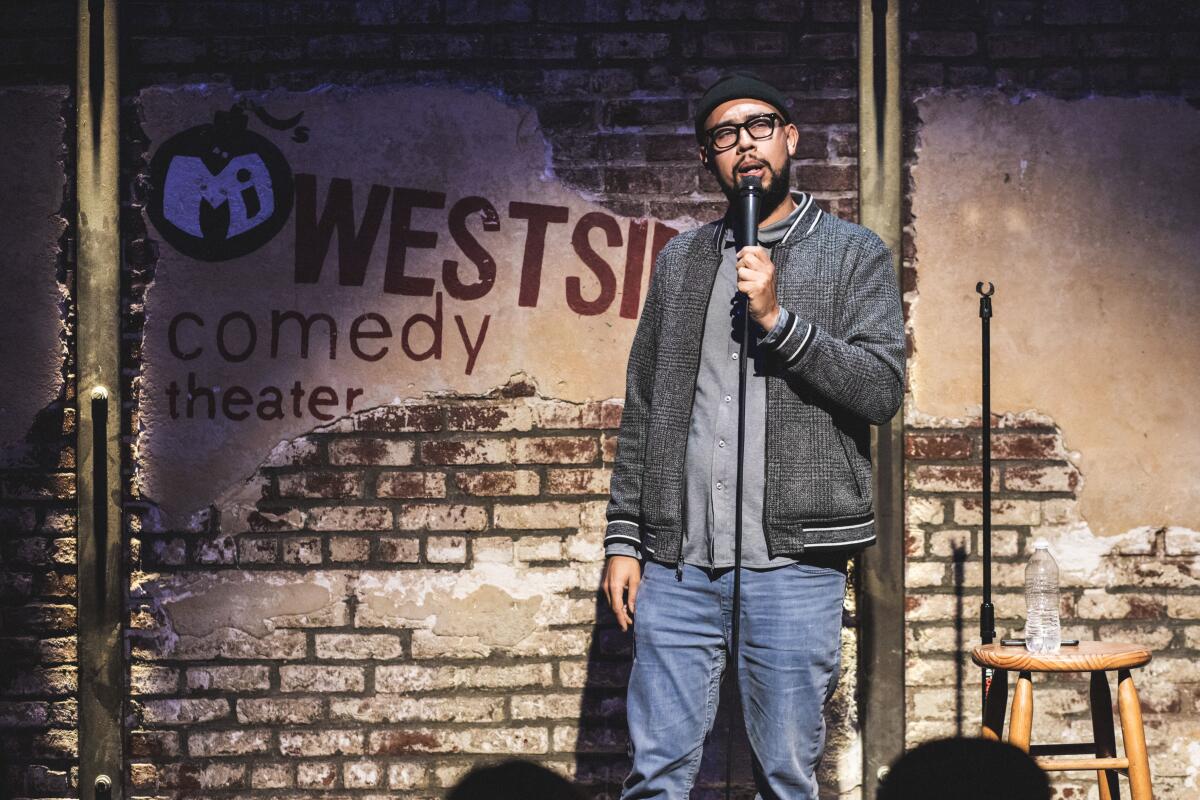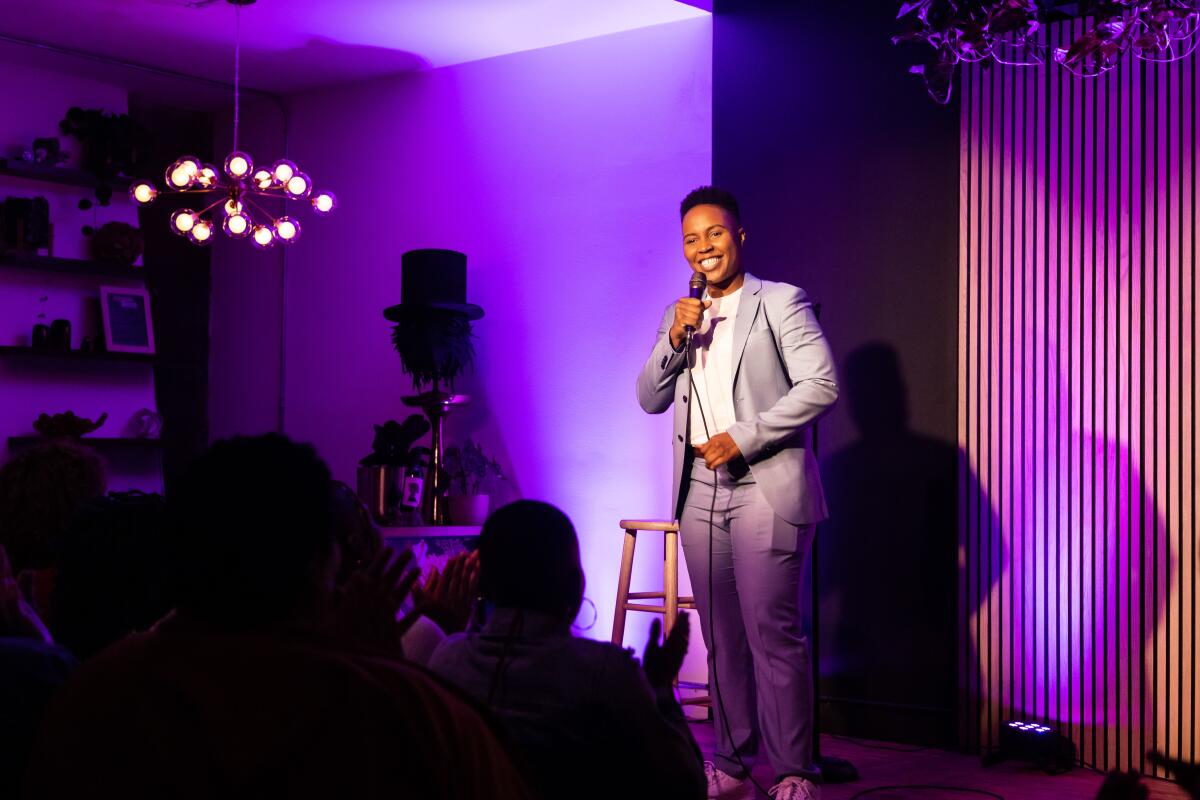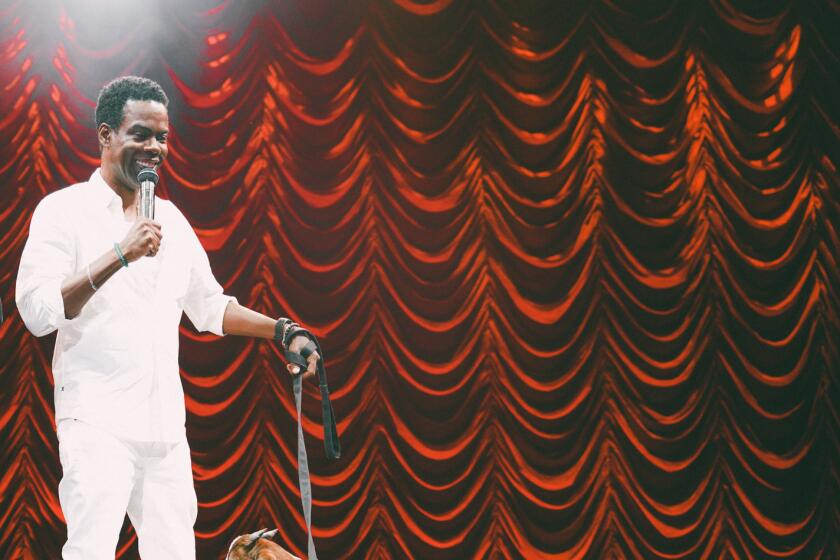L.A. stand-up specials stand out in a year of DIY comedy

- Share via
It was a banner year for stand-up fans in 2023, with the number of hourlong specials released clearing more than 200 titles. Why such record-breaking output? For one, following the 2021 reopening of comedy venues, the entire industry clicked into the same two-year-ish cycle typical of laboriously honing material, filming, editing, releasing and promoting.
“There was a big bump in stand-up because everybody was on strike,” notes “Laugh After Dark” director Kelsey Borlan. With partner Robert E. Lee, Borlan independently produced seven 2023 specials from L.A. and Las Vegas comics, kicking off with Kalea McNeill at Santa Monica comedy club the Crow. Additionally, she says, “A lot of people who’ve been in the game for a long time are proud of everything they’ve accomplished. And now, just like with music and most creative endeavors, the bar to entry has lowered and become more egalitarian. It’s an independent economy.”
For the record:
11:59 a.m. Dec. 28, 2023An earlier version of this article stated that Luenell’s stand-up special aired on Max. It aired on Netflix.
Netflix ended the year replete with specials from Chris Rock, Ricky Gervais, John Mulaney, Wanda Sykes, Bert Kreischer, Trevor Noah, Amy Schumer, Mo’Nique, Tom Segura, Andrew Santino, Hannah Gadsby, Mae Martin, Beth Stelling, Michelle Wolf, Jim Jefferies, Pete Holmes, Mike Birbiglia, Luenell (under the Chappelle’s Home Team banner) and more. Lavell Crawford hit Showtime; Max added Marc Maron, Tracy Morgan, Marlon Wayans, Sarah Silverman, Sam Jay and John Early.
Elsewhere, Whitney Cummings continued her relationship with OnlyFans, OutTV featured Justin Martindale, and Zainab Johnson, Trevor Wallace and Jimmy O. Yang took to Prime. For every Kevin Hart or Chris Fleming special on Peacock, fans could track down Roseanne Barr and Rob Schneider on Fox Nation. Prior to autumn accusations of sexual assault, Russell Brand went pay-per-view on Rumble, a platform that refers to itself as “immune to cancel culture.”
“It’s rare to get on those platforms,” director Delmar Washington says of larger brand distributors. “If you can, great. But if not, self-distributing or going to some of the smaller networks is just as powerful.” Washington’s “Microphone Masters” trio of specials from Kanisha Buss, Ron G and Brandon Lewis filmed at North Hollywood’s El Portal Theater in July and reach The Black Experience on Comcast’s Xfinity this month.
Other December entries include Eagle Rock royalty Maria Bamford on AppleTV and Brian Posehn’s two-week exclusive run on Moment. Veeps, a livestreaming platform owned by Live Nation, presented specials from L.A.-based comics Brad Williams, Blair Socci and Mo Welch. Taylor Williamson borrowed the Comedy Store’s Main Room for a YouTube release timed to Hanukkah.

Matt Rife’s two 2023 specials proved the power of self-producing and uploading directly to YouTube, boasting 18 million and 10 million views. The monetized streamer also helped local performers grow internationally, as demonstrated by L.A. talent like Maz Jobrani, Bob the Drag Queen, Kelsey Cook, Nate Craig, Jamar Neighbors, Anjelah Johnson-Reyes, Drew Lynch, Alex Nussbaum, Ian Bagg, Brad Wenzel, Tuesday Thomas, Nick Youssef, Jeremiah Watkins, Ryan Sickler, Jay Larson, Bret Ernst and recent Vegas transplant Noah Gardenswartz. (Leah Rudick even paired her YouTube special premiere with its release with Apple and Prime.)
The biggest benefit, says Jesus Trejo, is “the freedom it offers,” meaning “the flexibility in editing and release timing” in addition to “creative liberty to shape the special’s look and feel, as long as you have the means to bring the vision to life.”
Trejo’s 2020 debut hour, “Stay at Home Son,” ran on Showtime. “I wanted to use that knowledge to create something new,” he says, choosing to do so at the Hollywood Improv Lab.
“There’s something truly magical about the journey an artist takes from just a spark of an idea — thinking, ‘I want to create a self-produced comedy special’ — to the moment where it’s a reality, the upload is complete and people can see it on YouTube,” says Trejo. “The cherry on top was finding out I was going to be returning to ‘The Tonight Show With Jimmy Fallon’ to perform and promote my self-released special.”
In 2018, “Laugh After Dark” released the first independent stand-up comedy on Amazon, says Borlan. “Comedy is like most things in our society: There’s the 1%, and then there’s the 99. The bulk of the industry is the 99.” Production and distribution are important, but she calls marketing “the most important piece. You’re in a business and you are the business, and you have to treat it that way. You have to change from seeing yourself as the artist to the marketing manager.”

Borlan calls YouTube “the democratization of creation, that it’s not only a $100,000- dollar camera is the only way to make things happen, that you can make it happen on your iPhone, and you can put it on YouTube and you can make a living doing those things.”
“There’s the flexibility of not having to wait for the gatekeepers anymore,” agrees “Microphone Masters” host and executive producer Affion Crockett, whose 2019 debut was distributed by Kevin Hart’s LOL through Peacock, Xumo and more. “The majors have total control over everything and they’ll play your special twice, and they own it outright, and they can decide to just shelve it. When you do it yourself, you have the opportunity to keep replaying it or relicensing it, because you have the ownership to do so.”
He credits Houston’s Ali Siddiq for “going directly to YouTube and dropping an hourlong special every quarter, it feels like. And his touring numbers are going up. He’s got millions and millions of views.”
Director and executive producer Washington agrees. “It is really important to take your own career and your own IP in your own hands,” he says. “Even down to full creative control of just the way the set looks, the lighting, the type of audience you want to bring in.”
YouTube half-hours from the likes of Sarah Tiana, Natalie Cuomo and Omid Singh marked similar career progression. “The advantage of having a self-produced special was keeping 100% control of my art. I didn’t have anyone tell me what they think I should or shouldn’t do with my special,” says Singh, the first comic to film at Brad Garrett’s Comedy Club (for a special that Garrett also produced). “The disadvantages were marketing, but the special still managed to acquire millions of views on TikTok and Instagram. Thanks to Brad, I was able to post clips on YouTube, monetize for the first time and start gaining subscribers.”
Even after Rife’s third comedy special of 2023, “Natural Selection,” arrived in November on Netflix, the reception for his earlier self-released material was far kinder than his debut on the big-time streamer (currently it’s rated at 17% on Rotten Tomatoes). Which, as stand-up content continues trickling in at year’s end, marks a defining advantage of 2024’s imminent crop of DIY specials.
“Earning a few bucks would be nice, but that wasn’t my main goal,” Trejo says of his output. “My dream has always been simple: to write, to make people laugh with my jokes, and to share my work with the world. Anything beyond that is a bonus.”
More to Read
The biggest entertainment stories
Get our big stories about Hollywood, film, television, music, arts, culture and more right in your inbox as soon as they publish.
You may occasionally receive promotional content from the Los Angeles Times.











